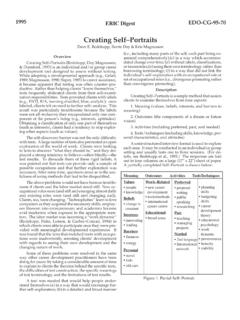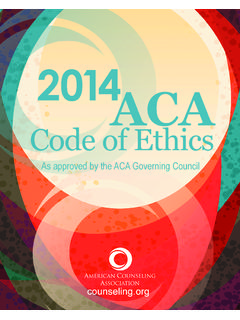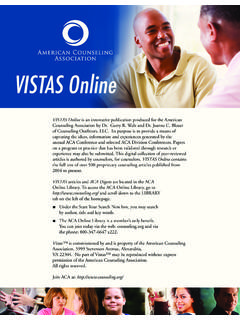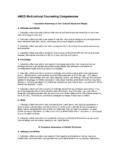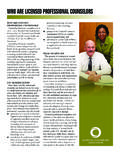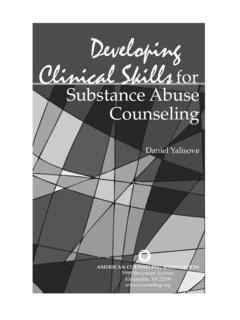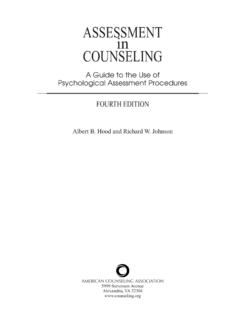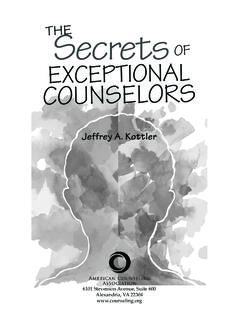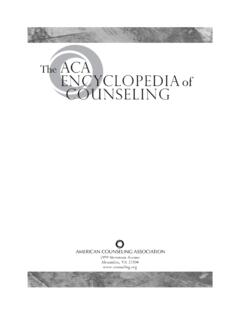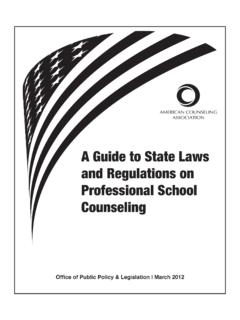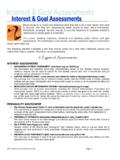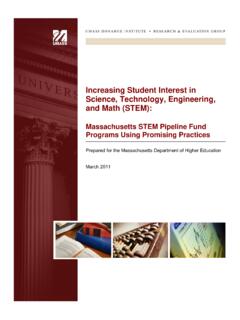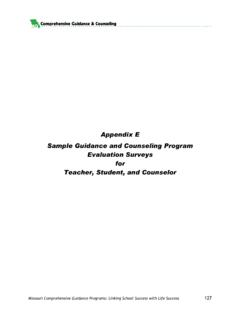Transcription of Assessment in Career Counseling
1 1995 EDO-CG-95-18 Assessment in Career CounselingDale J. Prediger4. Transformation of Assessment Data: Requirement of HelpfulAssessmentAssessment data (standard scores, percentile ranks, etc.)must go through a series of transformations if they are to behelpful in Career Counseling . First, data must be transformedinto Counseling , Career options worthy of ex-ploration. Next, a short list of options must be transformed , self-evaluated activities and experiences. Finally, self-evaluations and self-concepts must be transformed into careerplans. Because of the research and technology involved (seebelow), counselors should require that test publishers take pri-mary responsibility for the first transformation. Counselors andcounselees share responsibility for the other Data-Information Transformation: Bridge to Reality In a 30-year-old text on test interpretation fundamentals(many of which are ignored today), Goldman (1971) describedthe following three models for transforming Assessment datainto Counseling information--for bridging the gap between ascore and its real-world interpretations: Bridge for those with time.
2 The labor-intensive clinical interpretation model (see Goldman, 1971, forspecifics) is shaky at best--unless counselors are very well trainedand have a light load. It is often supported by little more than alist of scores; a vague understanding of measurement error, va-lidity coefficients, and hit rates ; specific knowledge about afew occupations and a mystical reliance on counselor/counseleeintuition. While intuition can contribute to Assessment for ca-reer Counseling , counselors should expect publishers of assess-ment instruments to help them bridge the gap between scoresand their predictions: Bridge to nowhere. Presumably, the pre-diction model can forecast levels of occupational success. Pre-sumably, a counselor can say (for example): Pat, based on yourtest scores, chances are about 59 out of 100 that you will bemoderately `successful as a Counseling psychologist and 27 outof 100 that you will be highly `successful.
3 Now, as for flightattendant and pediatrician, .. Unfortunately, research indi-cates that so-called actuarial methods can never provide pre-dictions of occupational success for enough occupations andwith enough precision to be of use in Career exploration ( ,see Goldman, 1994; Prediger, 1974). Nevertheless, the latest claimis that success predictions based on general mental ability (for-merly called IQ) can be provided and compared across nearly alloccupations. This is despite the facts that: (a) success is de-fined differently from occupation to occupation (b) defensiblemeasures of level of success are often unavailable ( , for coun-seling psychologist, pediatrician); (c) predictor-success correla-tions are available for relatively few occupations; and (d) whenavailable, prediction errors are large. Attempts to predict occupational choice are also unwar-ranted.
4 Besides, what counselor would want to say (for ex-ample): Pat, chances are 73 out of 100 you will become a nurse,[etc.] ? According to Zytowski (1994), the prediction model isthe failed relationship (p. 222) between tests and Career estimates: Bridge to the work world. The similaritymodel ( you look like a person who ) can be used to survey thework world in order to identify occupational options warrant-ing exploration. (For over 60 years, interpretations of the StrongInterest Inventory Occupational Scales have been based on this In choosing an occupation one is, in effect, choosing ameans of implementing a self-concept (Super, 1957, p. 196).What might be called Super s Dictum has an antecedent inancient Greek thought: Know Thyself. It was formulated inthe early days of the Career development revolution that even-tually swept away square-peg-square-hole thinking about as-sessment.)
5 Current thinking regarding the role of Assessment incareer development and Counseling represents an extension ofSuper s Dictum and a revitalization of trait and factor theory. Since the content of Assessment in Career Counseling ( ,interests, abilities, Career certainty) is well-covered by other di-gests in this series (also see Kapes, Mastie, & Whitfield, 1994),this digest focuses on the process--specifically, the contributionof Assessment procedures to Career exploration and planning.(Super s Dictum on choosing an occupation encompasses thetrial occupational choices characterizing exploration and plan-ning.) Because these Career development tasks are experiencedby everyone, this digest addresses Assessment for the many ( ,via Career planning courses) rather than intensive, problem-fo-cused Career Considerations1. Trait and Factor Theory: The Foundation for Assessment Assessment procedures used in Career Counseling havetheir roots in tests used for diagnostic screening and personnelselection (hiring).
6 As a result, the test em and tell em ap-proach to test use and the focus of scores on arbitrary decisionpoints ( , helping Pat choose a Career at 10:20 on Tues-day, March 17th) were major problems at one time. Trait andfactor theory was and continues to be blamed for these prob-lems. However, there is nothing inherently wrong with assess-ing human traits. Indeed, Assessment is part of human nature;for millennia, we have sized-up strangers and acquaintan-ces. Misinterpretations and misapplications of trait and factortheory are now widely recognized and there have been severalrecent attempts to place trait Assessment into the context of ca-reer development theory ( , see Chartrand, 1991; Rounds &Tracey, 1990).2. Self-Concept: The Basis for Career Choice According to Super s Dictum, an occupation gives one thechance to be the kind of person one wants to be; hence, careerchoices are based on self-concepts projected into Career follows that a major task in Career Counseling is to elicit andinform self-concepts---not a simple process (Betz, 1994) unlessone prioritizes components according to Career relevance.
7 Faultyself-concepts are likely to result in flawed plans and and Cramer (1992) said it this way: The major concern ina Career [development] model is the clarity and accuracy of theself-concept as the evaluative base by which to judge availablecareer options (p. 155).3. Assessment : A Primary Means for Self/ Career ExplorationGiven today s complex array of Career options, one of themost difficult developmental tasks persons face is the identifi-cation and exploration of options congruent with their charac-teristics. Assessment can provide focus to Career exploration. Inthe process of Assessment and Career exploration, counseleeswill develop insights about themselves and the work world thatwill inform their self-concepts. In a nutshell, the major role ofassessment in Career Counseling is self/ Career exploration--acomplementary DigestsERIC Digests are in the public domain and may be freely reproduced and disseminated.
8 This publication was funded by the of Education, Office of Educational Research and Improvement, Contract No. RR93002004. Opinions expressed in this report donot necessarily reflect the positions of the Department of Education, OERI, or information on other ERIC/CASS products and services, please call toll-free (800) 414-9769 or (910) 334-4114 or fax (910)334-4116 or write ERIC/CASS, School of Education, University of North Carolina at Greensboro, Greensboro, NC ) The goal of the similarity model is not to predict level ofsuccess or to find the ideal Career . Rather, the goal is to say (forexample): Pat, here are some occupations that attract people whoare similar to you in several important ways. You may want to checkthem out. Research shows that observed differences among careergroups are of sufficient magnitude to provide focus to Career explo-ration ( , see Prediger, 1974; Rounds & Tracey, 1990; Zytowski,1994).
9 Counselors should expect publishers of Assessment instru-ments to provide them with an interpretive bridge based on simi-larity model research. Improvised, armchair structured searches should be Informed Self-Estimates: Key to Ability AssessmentUnfortunately, test scores are seldom available for many work-relevant , sales, leadership/management, organization,creative/artistic, social interaction. Too often, work-relevant abili-ties that can t be assessed by paper-and-pencil tests are ignored. Butcareer exploration based only on abilities for which there are testsnot only misses important abilities, it does not take account of thepowerful role of self-concepts in occupational choice (recall Super sDictum). Ability self-estimates bring work-relevant self-concepts tothe attention of the counselee and the counselor. Elsewhere, I havediscussed how informed self-estimates of abilities can be used to fa-cilitate self/ Career exploration (Prediger, 1994).
10 To be accurate, self-estimates must be informed by experience--including the abilityestimates provided by test scores, if they are Comprehensive, Articulated Assessment : A GoalCareer development theory makes it hard to defend Career ex-ploration based only on interests, only on abilities, or only on jobvalues ( , see Lowman, 1993). Nevertheless, some counselors stilltake a piecemeal approach to Career , interests inGrade 9; abilities 3 years later. Counselors may also face the prob-lem of interpreting interest, ability, etc. assessments based on differ-ent norms, profile formats, and work world structures. Some pub-lishers are responding to these problems with comprehensive, ar-ticulated Assessment programs. Counselors should expect Development of Possibilities into Realities: A RequirementOne of the Career counselor s primary functions is to helpcounselees develop Career possibilities into realities--that is, to fa-cilitate personal growth ( , building the abilities needed for a pre-ferred Career path).
